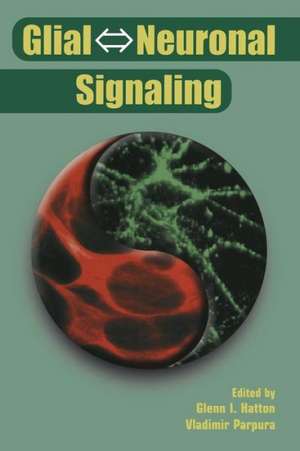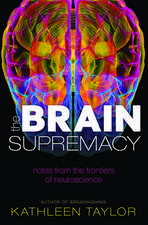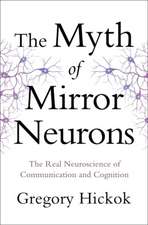Glial ⇔ Neuronal Signaling
Editat de Glenn I. Hatton, Vladimir Parpuraen Limba Engleză Paperback – 30 aug 2012
The chapters are written by the top researchers in the field of glial-neuronal signaling, and cover the most current advances in this field. The book will also be of value to the workers in the field of cell biology in general.
When we think about the brain we usually think about neurons. Although there are 100 billion neurons in mammalian brain, these cells do not constitute a majority. Quite the contrary, glial cells and other non-neuronal cells are 10-50 times more numerous than neurons. This book is meant to integrate the emerging body of information that has been accumulating, revealing the interactive nature of the brain's two major neural cell types, neurons and glia, in brain function.
| Toate formatele și edițiile | Preț | Express |
|---|---|---|
| Paperback (1) | 952.26 lei 6-8 săpt. | |
| Springer Us – 30 aug 2012 | 952.26 lei 6-8 săpt. | |
| Hardback (1) | 961.41 lei 6-8 săpt. | |
| Springer Us – 30 mai 2004 | 961.41 lei 6-8 săpt. |
Preț: 952.26 lei
Preț vechi: 1161.29 lei
-18% Nou
Puncte Express: 1428
Preț estimativ în valută:
182.22€ • 190.73$ • 151.66£
182.22€ • 190.73$ • 151.66£
Carte tipărită la comandă
Livrare economică 31 martie-14 aprilie
Preluare comenzi: 021 569.72.76
Specificații
ISBN-13: 9781475710694
ISBN-10: 1475710690
Pagini: 460
Ilustrații: XIII, 441 p. 289 illus.
Dimensiuni: 155 x 235 x 24 mm
Greutate: 0.64 kg
Ediția:Softcover reprint of the original 1st ed. 2004
Editura: Springer Us
Colecția Springer
Locul publicării:New York, NY, United States
ISBN-10: 1475710690
Pagini: 460
Ilustrații: XIII, 441 p. 289 illus.
Dimensiuni: 155 x 235 x 24 mm
Greutate: 0.64 kg
Ediția:Softcover reprint of the original 1st ed. 2004
Editura: Springer Us
Colecția Springer
Locul publicării:New York, NY, United States
Public țintă
ResearchDescriere
Glial Neuronal Signaling fills a need for a monograph/textbook to be used in advanced courses or graduate seminars aimed at exploring glial-neuronal interactions. Even experts in the field will find useful the authoritative summaries of evidence on ion channels and transporters in glia, genes involved in signaling during development, metabolic cross talk and cooperation between astrocytes and neurons, to mention but a few of the timely summaries of a wide range of glial-neuronal interactions.
The chapters are written by the top researchers in the field of glial-neuronal signaling, and cover the most current advances in this field. The book will also be of value to the workers in the field of cell biology in general.
When we think about the brain we usually think about neurons. Although there are 100 billion neurons in mammalian brain, these cells do not constitute a majority. Quite the contrary, glial cells and other non-neuronal cells are 10-50 times more numerous than neurons. This book is meant to integrate the emerging body of information that has been accumulating, revealing the interactive nature of the brain's two major neural cell types, neurons and glia, in brain function.
The chapters are written by the top researchers in the field of glial-neuronal signaling, and cover the most current advances in this field. The book will also be of value to the workers in the field of cell biology in general.
When we think about the brain we usually think about neurons. Although there are 100 billion neurons in mammalian brain, these cells do not constitute a majority. Quite the contrary, glial cells and other non-neuronal cells are 10-50 times more numerous than neurons. This book is meant to integrate the emerging body of information that has been accumulating, revealing the interactive nature of the brain's two major neural cell types, neurons and glia, in brain function.
Cuprins
Preface. List of contributors. 1. The glial-neuronal interactions and signaling: an introduction; S. Baltan Tekkök, B.R. Ransom. 2. Gene function in glial-neuronal interactions; L. Soustelle, A. Giangrande. 3. Structural association of glia with the various compartments of neurons; A. Reichenbach, A. Derouiche, J. Grosche, M. Hanani. 4. Morphological plasticity of astroglial/neuronal interactions: functional implications; G.I. Hatton. 5. Astroglia as a modulation interface between meninges and neurons; F. Mercier. 6. Expression and possible functions of glutamate and GABA receptors in glial cells from the hippocampus; Min Zhou, H.K. Kimelberg. 7. Ion channels in astrocytes; G. Seifert, C. Steinhäuser. 8. Specialized channels in astrocytes; K.A. Parkerson, H. Sontheimer. 9. Glutamate uptake by astroglia; D.E. Bergles, J.D. Rothstein. 10. pH regulation and acid/base-mediated transport in glial cells; J.W. Deitmer. 11. Glial-neuronal interactions and brain energy metabolism; A.M. Brown, S. Baltan Tekkök, B.R. Ransom. 12. Calcium signaling in glia; H. Kettenmann, C.G. Schipke. 13. Astrocyte gap junctions and glutamate-induced neurotoxicity; C. Giaume, W. Même, A. Koulakoff. 14. Mechanism and significance of astrocytic Ca2+ signaling; G. Arcuino, M. Cotrina, M. Nedergaard. 15. Glutamate-mediated bi-directional signaling between neurons and astrocytes; V. Parpura. 16.The regulated release of transmitters from astrocytes; D.S. Evanko, Jai-Yoon Sul, Qi Zhang, P.G. Haydon. 17. Role of astrocytes in the formation, maturation and maintenance of synapses; M. Slezak, F.W. Pfrieger. Index. Accompanying CD contains electronic files of all figures, including color, tables and movies: inside back cover.










